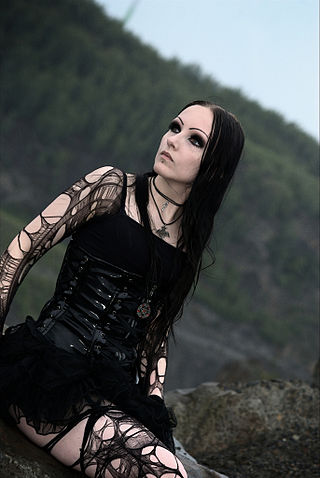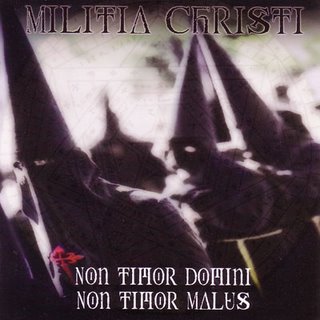Related Research Articles
Gothic rock is a style of rock music that emerged from post-punk in the United Kingdom in the late 1970s. The first post-punk bands which shifted toward dark music with gothic overtones include Siouxsie and the Banshees, Joy Division, Bauhaus, and the Cure.
Doom metal is an extreme subgenre of heavy metal music that typically uses slower tempos, low-tuned guitars and a much "thicker" or "heavier" sound than other heavy metal genres. Both the music and the lyrics are intended to evoke a sense of despair, dread, and impending doom. The genre is strongly influenced by the early work of Black Sabbath, who formed a prototype for doom metal. During the first half of the 1980s, a number of bands such as Witchfinder General and Pagan Altar from England, American bands Pentagram, Saint Vitus, the Obsessed, Trouble, and Cirith Ungol, and Swedish band Candlemass defined doom metal as a distinct genre. Pentagram, Saint Vitus, Trouble and Candlemass have been referred to as "the Big Four of Doom Metal".
Dark wave is a music genre that emerged from the new wave and post-punk movement of the late 1970s. Dark wave compositions are largely based on minor key tonality and introspective lyrics and have been perceived as being dark, romantic and bleak, with an undertone of sorrow. The genre embraces a range of styles including cold wave, ethereal wave, gothic rock, neoclassical dark wave and neofolk.
Elend is a dark ambient/neoclassical band formed in France in 1993 by composers and multi-instrumentalists Iskandar Hasnawi of France and Renaud Tschirner of Austria. The band's name is German for "misery." Their music can be described as a combination of contemporary classical music and gothic.
Symphonic metal is a cross-generic style designation for the symphonic subsets of heavy metal music subgenres. It is used to denote any metal band that makes use of symphonic or orchestral elements. The style features the heavy drums and guitars of metal with different elements of orchestral classical music, such as symphonic instruments, choirs and sometimes a full orchestra, or just keyboard orchestration.
Pagan rock is a genre of rock music created by adherents of neopagan traditions. It emerged as a distinct genre from gothic rock in the 1980s. Bands in this genre will often use pagan and occult imagery and deal with pagan themes. In some cases the definition is stretched to include rock bands embraced by modern Pagans.
Martial industrial is a syncretic offshoot of industrial music characterized by noise, dark ambient atmospheres, neofolk melodies, dark wave tunes and neoclassical orchestrations as well as the incorporation of audio from military marches, historical speeches and political, apolitical or metapolitical lyrics. Unlike other post-industrial genres, martial industrial is typically interested more in a particular worldview or philosophy than pure experimentalism.
Gothic metal is a fusion genre combining the aggression of heavy metal with the dark atmospheres of gothic rock. The music of gothic metal is diverse with bands known to adopt the gothic approach to different styles of heavy metal music. The genre originated during the early 1990s in the United Kingdom originally as an outgrowth of death-doom, a fusion of death metal and doom metal. Lyrics are generally dark and introspective with inspiration from gothic fiction as well as personal experiences.

Dark culture, also called dark alternative scene, includes goth and dark wave culture, the dark neoclassical/dark ambient scene, parts of the post-industrial scene parts of neofolk and the early gothic metal scene. Dark culture's origin lies in followers of dark wave and independent music, but over the decades it has developed to a social network held together by a common concept of aesthetics, self-representation, and individualism. The musical preferences of the dark scene are characterized by a mix of styles ranging from futurism, electropop, early music, (neo-) classical, and folk music to punk rock, rock, techno and ambient music.

Theatres des Vampires is an Italian gothic metal band, mostly noted for the predominant theme of vampirism within their lyrics. The band's early material was credited as melodic black metal or symphonic black metal, but the group completely abandoned all black metal influence by the mid-2000s. Theatres des Vampires have released eleven full-length albums.
Post-metal is a music genre rooted in heavy metal but exploring approaches beyond metal conventions. It emerged in the 1990s with bands such as Neurosis and Godflesh, who transformed metal texture through experimental composition. In a way similar to the predecessor genres post-rock and post-hardcore, post-metal offsets the darkness and intensity of extreme metal with an emphasis on atmosphere, emotion, and even "revelation", developing an expansive but introspective sound variously imbued with elements of ambient, noise, psychedelic, progressive, and classical music, and often shoegaze and art rock. Songs are typically long, with loose and layered structures that discard the verse–chorus form in favor of crescendos and repeating themes. The sound centres on guitars and drums, while any vocals are usually screamed or growled and resemble an additional instrument.

Infernal Poetry is an Italian death metal band from Ancona, who formed in 1996 and disbanded in 2014. The band started as a death metal act mixing US brutality and Scandinavian melody, adding new elements during 17 years of activities and creating a style that was self-defined as 'Schizo Metal'. The band released four albums, 2 EPs and one split release with Dark Lunacy.

Stream from the Heavens is the only studio album by Finnish doom metal band Thergothon. It was recorded in late 1992 and released after many delays on June 15, 1994 through the Italian record label Avantgarde Music. The band had eventually disbanded a year before the release of the album. Stream from the Heavens continues the funeral doom subgenre that Thergothon pioneered with their 1991 demo Fhtagn nagh Yog-Sothoth. The album was re-issued on CD in 1999 and also in 2004 by Belgian label Painiac as a 12" LP, limited to 500 copies.
Daimonion are a Polish band from Piotrków Trybunalski established in 1994. They play an energetic, colourful and spatial variety of atmospheric rock, rooted somewhere in the gothic scene of the 1980s and 1990s. The musical formula of the group is constantly enriched with elements characteristic of such genres as trance, ambient, post rock or shoegaze.

Non timor domini, non timor malus is the second studio album by the Italian Black ambient/Gothic rock band Militia Christi.

Ordo Militia Templi is the first studio album by the Italian Black ambient/Gothic rock band Militia Christi.
Orkus is a monthly German music and culture magazine published by the Zoomia Media Group. Despite its subtitle and its web tagline, it includes all popular music genres including metal, medieval rock, Neue Deutsche Härte, alternative rock, electro and futurepop. The gothic rock, dark wave and industrial music genres have had only a minor presence since the late 1990s.

Modern pagan music or neopagan music is music created for or influenced by modern Paganism. Music produced in the interwar period include efforts from the Latvian Dievturība movement and the Norwegian composer Geirr Tveitt. The counterculture of the 1960s established British folk revival and world music as influences for American neopagan music. Second-wave feminism created women's music which includes influences from feminist versions of neopaganism. The United States also produced Moondog, a Norse neopagan street musician and composer. The postwar neopagan organisations Ásatrúarfélagið in Iceland and Romuva in Lithuania have been led by musicians.
References
- ↑ "Interview to Fabian Varesi" . Retrieved 2011-02-02.